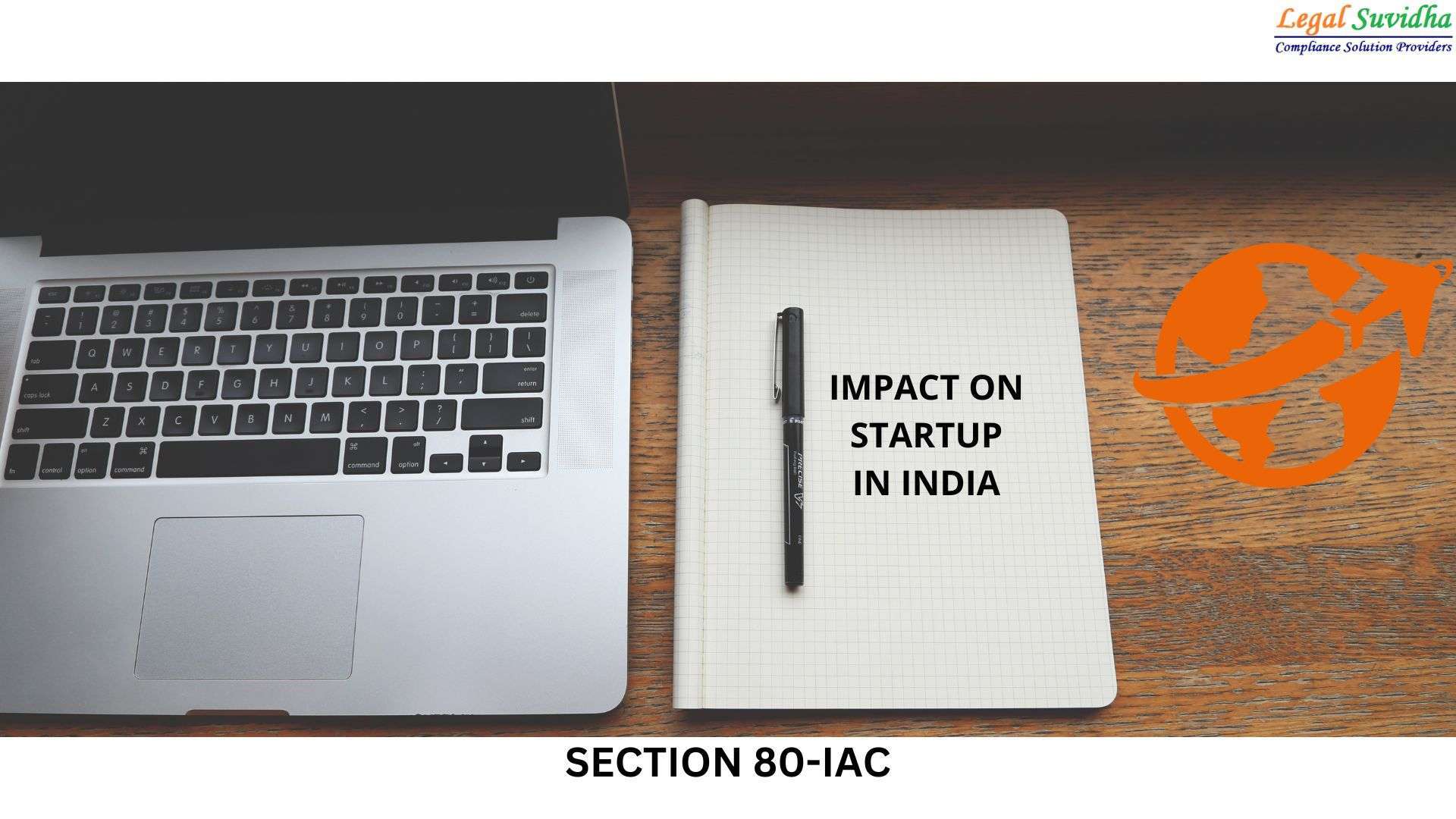SECTION 80IAC AND ITS IMPACT ON STARTUPS IN INDIA
What is Section 80IAC?
The Government of India has taken the initiative of Startup India to enhance the startup environment in the country. The major purpose of the same is to make an environment facilitative to the growth and development of startups in India. As per Section 80IAC of the income tax act, it furnishes tax incentives for startups. The major key component of the program is that it furnishes tax benefits to the qualified startups for their initial three years of procedure under section 80IAC.
Under the benefits, it gives a 100% tax exemption on the incurred profits that the startup made in its initial three years of operation given that the startup fulfills the criteria as mentioned. It is essential for the startup to get registered as a private limited company so as to meet the eligibility criteria for the exemptions of taxes, also it should raise the funding of at least Rs.25 lakhs in the initial five years of its functioning.
Indeed it is vital for the startup to get engaged in the new product or service development and holds a turnover of less than Rs 25 cr. Section 80IAC of the Income Tax Act has had a significant impact on startups. Tax incentives have boosted the Indian startup ecosystem to a great extent.
It is now possible for startups to invest more money into their operations, allowing them to develop new products and services. The government has also encouraged investors to invest in startups by providing tax incentives. This has led to a rise in venture capital investments in startups, which has provided much-needed capital to them.
Section 80IAC, which was enacted under the Income Tax Act, has generally had a positive effect on startups. In India, it has furnished a required boost to the startup ecosystem and would motivate investors to invest in the startups.
Deduction under Section 80IAC:
Section 80-IAC of the Income Tax Act of India allows for 100% deduction of profits and gains from an eligible business for a period of 10 consecutive assessment years. This deduction is available to eligible start-ups that are incorporated on or after 1st April 2016 and are engaged in the eligible business.
To claim the deduction under Section 80-IAC, the start-up must fulfill the following conditions:
- It must be incorporated on or after April 1st, 2016.
- Its turnover must not exceed Rs. 100 crores in any of the financial years during the period of 10 consecutive assessment years from the year in which the business begins.
- The start-up should be engaged in an eligible business that includes innovation, development, or improvement of products or processes, or services or scalability of such business with a high potential of employment generation or wealth creation.
- The start-up should be certified by the Inter-Ministerial Board of Certification as an eligible start-up and this certification should be valid on the date of filing of the return of income.
- The start-up should file a declaration in Form 10-IAC in the prescribed format before the due date of filing of return of income.
It’s important to note that the deduction under Section 80-IAC is available only to the eligible start-up and not to the partners or shareholders of the start-up.
Process of Obtaining Certificate for Section 80IAC:
To claim the 100% deduction of profits and gains under Section 80-IAC of the Income Tax Act of India, a start-up must first obtain a certificate of eligibility from the Inter-Ministerial Board of Certification (IMB). The certificate process is as follows:
- Eligibility criteria: The start-up should meet the eligibility criteria as specified in Section 80-IAC of the Income Tax Act, such as being incorporated on or after April 1st, 2016, having a turnover not exceeding Rs. 100 crores, and being engaged in an eligible business.
- Application: The start-up should apply for the certificate of eligibility on the official website of the Department for Promotion of Industry and Internal Trade (DPIIT). The application should be made in the prescribed form and should be accompanied by the required documents.
- Screening: The application is screened by the DPIIT officials to ensure that the start-up meets the eligibility criteria.
- Assessment: The DPIIT officials conduct an assessment of the start-up to determine if it has a high potential for employment generation or wealth creation.
- Approval: If the start-up is found to be eligible, the DPIIT officials approve the application and issue the certificate of eligibility.
- Validity: The certificate of eligibility is valid for a period of 12 months from the date of issue.
It’s important to note that the start-up should file a declaration in Form 10-IAC in the prescribed format before the due date of filing of return of income
Revocation process for Section 80-IAC:
The revocation process for the certificate of eligibility under Section 80-IAC of the Income Tax Act of India is as follows:
- Grounds for revocation: The Inter-Ministerial Board of Certification (IMB) can revoke the certificate of eligibility if it finds that the start-up no longer meets the eligibility criteria, such as having a turnover exceeding Rs. 100 crores, or if the start-up has made false statements or misrepresentations in its application.
- Show Cause Notice: The IMB will issue a show cause notice to the start-up, asking for an explanation for why the certificate should not be revoked. The start-up should respond to the notice within the time specified in the notice.
- Hearing: The IMB may conduct a hearing to consider the start-up’s response to the show cause notice. The start-up should be given an opportunity to present its case and provide evidence to support its position.
- Decision: After considering the start-up’s response and conducting a hearing, if necessary, the IMB will make a decision on whether to revoke the certificate of eligibility.
- Appeal: The start-up can appeal the decision of the IMB to the Appellate Authority for Industrial and Financial Reconstruction (AAIFR) within 30 days of the decision.
It’s important to note that the revocation of the certificate of eligibility under Section 80-IAC will result in the start-up being ineligible to claim the 100% deduction of profits and gains for the relevant assessment year.




















